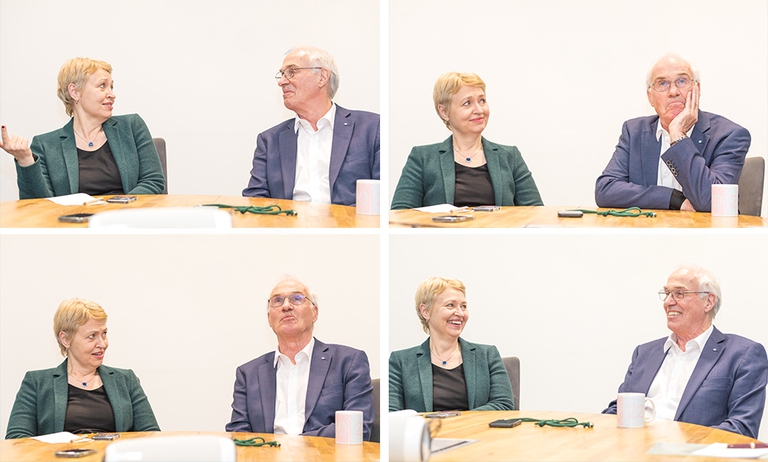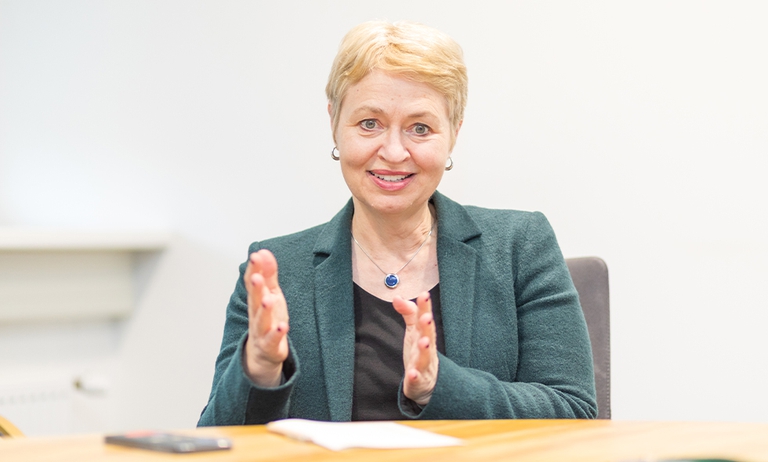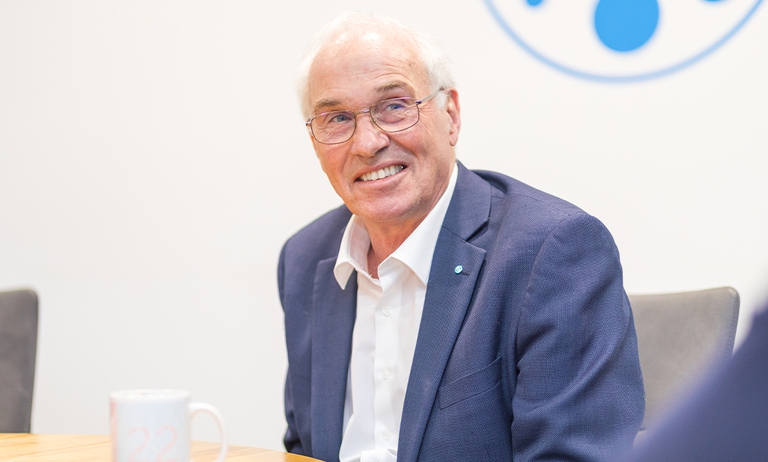Change in Management at DESY | Double interview
Press & Communications
Change in Management at DESY | Double interview
Beate, Helmut – can you remember your first day at DESY?
Beate Heinemann: I had three of them: in 1987/88 as a pupil on the advanced physics course. At the time, I didn't understand much of what was being said – DESY was like a new universe for me. The second time, I was already at university and was on campus more often for practicals, my diploma, and doctoral thesis. And finally, I came back in 2016 after 16 years abroad. I still remember the warm welcome I received from the DESY staff.
Helmut Dosch: The very first time I was on the DESY campus was around 1988, when I registered a project here after returning from the USA. Man, those were the days... When I think of my first day in the office, I immediately think of the weather: cloudy, single-digit temperatures. "Great" was all I could think.
Helmut, did you have the personality or the desire to be at the top from the start – or did everything just happen the way it did?
Helmut Dosch: A difficult question. One day you become a class rep – and 35 years later a spokesperson for a European consortium. I suppose that some of my character traits fit: I'm rather hands-on and have boundless self-confidence; you definitely need that. I think I've always been very empathetic; that also helps. And you develop the necessary assertiveness over time. However, I never had a well-timed career plan. Today, everyone would say: "Wow, Dosch, incredible!" – but that's how it was. I still remember: when I left the house, my father – he was a civil servant on the railway – shouted after me: "Listen to me, no matter where you are and what you're doing: do your job well and don't moan about it." And I followed that, one thing led to another.
Beate, when did you know that you would go into science?
Beate Heinemann: It was first clear to me during my Au Pair year after graduating school that I wanted to study physics. But I never imagined that I would become a physics professor. The role model of a female professor didn't really exist in public at that time. However, I noticed during my studies that I was good at physics and it was fun for me. So I just kept on going. A lot came out of that. I didn't plan my career so strategically.
Helmut Dosch: I have to add to that: the times were just different back then. We made forward progress with every day. Young people today face much more difficult conditions.
Beate Heinemann: That's true. In my generation, the parents – my father was a lawyer, my mother a nurse – always wished that their kids would do (even) better; at that time that was a realistic wish.
Beate, you have got to know DESY from different perspectives and from different career levels. Does that help you in your new role, does that give you confidence when dealing with DESY employees?
Beate Heinemann: Definitely! I was recruited by Albrecht Wagner, Bjørn Wiik was Managing Director; an incredibly nice person - but he felt incredibly distant to me. Being aware of how unapproachable you might seem to the staff certainly helps me in my interactions with people at DESY.
Helmut Dosch: I would like to take this opportunity to say something about the DESY staff: we have this unique spirit at DESY that I have never experienced at any other centre. Nor do I know of any other centre where the employees are named after the centre.
Beate Heinemann: I couldn't agree more. There's this warmth at DESY, this identification with the centre... simply amazing.
Helmut Dosch: That's an interesting question, by the way. Where does this kind of spirit come from?
Beate Heinemann: There's a question that's even more important than that one: what do you have to do to keep it?
Helmut Dosch: Absolutely, absolutely.
What are the important facts of a good DESY spirit?
Helmut Dosch: First of all, we have a very intelligent Board of Directors where decisions are made jointly and not by a single person. I have experienced this often enough. Looking back, I see this as an incredibly quality-assuring feature. We are a very open centre that is managed transparently. And we attach great importance to ensuring that every single person is heard.
Does the management of the centre actually differ according to the original the division?
Beate Heinemann: I don't think so. DESY can only be successful if every division is succesful.
Helmut Dosch: I agree. We are a research centre, we have a mission: to decode matter. And we are doing this on a scale and at a level that no one else can match. The chairperson must understand and have a handle on the breadth of the entire portfolio. And Beate is the ideal person.
Review and outlook: Helmut, what is your personal highlight of the 16 years at DESY?
Helmut Dosch: My highlight is the success of the centre's overall modernisation strategy. We have become more modern, more attractive and more diverse in Hamburg and Zeuthen. We have succeeded in strategically aligning our cutting-edge research - and we have created an innovation ecosystem that was initially laughed at.
Beate, what would you like to achieve?
Beate Heinemann: The most important thing is to get another major project off the ground at DESY: PETRA IV. The outstanding groundwork serves as a golden chance that we must now seize to score our goal. We have to get the project financed and then realise it on schedule and within budget. Secondly, I want to push ahead with Science City Hamburg Bahrenfeld as a whole so that the region around DESY is modernised... Helmut, you left me a lot of construction sites ...
Helmut Dosch: Positive construction sites ...
Beate Heinemann: Yes, physical construction sites (both laugh). Once they are finished, the campus will be even more modern and attractive. That also applies to Zeuthen, of course. The campus has developed incredibly well.
Is there something that you want to do differently from your predecessor?
Beate Heinemann: Not any big conceptual things – the strategy that I was already involved in through my work in the Directorate is there. Of course, we could improve digitalisation, smooth out processes, increase transparency – those are for me a major concern. At the same time, we have to consider what we do not want to change. Among those things are that we want to make sure that the employees feel comfortable and that we drive international cooperations forward.
What would you have done differently in the last 16 years?
Helmut Dosch: My interaction with Russia. I have to say that plain and simple. Until 2014, I made an intensive effort to integrate Russia into the European research system, and maybe I ignored the warnings from opposing scientists for too long. That was a mistake. That I would do differenly today. Looking back, that was ignorant or naive. A personal disappointment.
While we're talking about the situation in the world: how do you judge the current situation with regard to science in the United States under the Trump Administration?
Helmut Dosch: It's highly disconcerting for us to observe the rapid developments there. From my viewpoint, Beate, we can't wait too long to position ourselves and to express our support for the scientists and for the research centres and organisations.
Beate Heinemann: There I'm in complete agreement with Helmut: I see the developments in the USA with great concern. I myself researched there for a long time and am in contact with many people. We need to position ourselves. We need to help. We must defend as well as strengthen scientific freedom.
Back to DESY, back to the management handover – with the request that you complete two short sentences:
On the first day of my new phase in life, I will...
Helmut Dosch: ... throw the alarm clock out the window.
Beate Heinemann: ... first settle in. That day I've kept open in my calendar...and I'll prepare for the first Directorate meeting under my leadership, that's on the second day.
I am most looking forward to...
Beate Heinemann: ... shaping DESY together with the employees and the Directorate.
Helmut Dosch: ... having more time for family – and that I will still be able to continue my international responsibilities.
Are there concrete plans?
Helmut Dosch: I can only say: My wife is already concerned that there'll be too many requests. But the lovely thing is that one only does what's fun.
Beate Heinemann: But science isn't losing you...
Helmut Dosch: No, no.
What thoughts will be particularly difficult for you on the last day at DESY?
Helmut Dosch: I have no worries that I'll miss something. The last five years were extremely taxing, to be honest. That also gets into the nitty-gritty. We find ourselves in difficult times, but the house itself is in good condition. After 16 years full steam, I'm leaving calmly, also with the knowledge that the perfect successor is there.
Beate, can you describe your leadership style?
Beate Heinemann: For me, it's extremely important to trust people and to give them responsibility. I want to create free spaces for myself: for DESY's strategic development and also for external communication. My problem is more that I have too many topics for which I have a burning interest.
Helmut Dosch: The big plus with Beate is that above all she is interested in people.
Keyword communication...
Beate Heinemann: Internal communication is still a core topic. I think there's more to be done there. For example, with the "Sympathetic Ear." It'd be great if in this context DESYans could make suggestions for improvement.
Helmut Dosch: We already did that years ago in a survey. There came the suggestion: "We'd like to have an ice cream seller on campus...."
Beate Heinemann: That you implemented smoothly. Even pretty cost-neutral (both laugh). But again, seriously: Communication is unbelievably important to me. One can absolutely not overvalue that.
Helmut feels a certain relief – do you feel the pressure of expectation?
Beate Heinemann: I don't sense any pressure. But there are already expectations – and a lot of curiosity. The pressure I rather make on myself: I want to shore up PETRA IV.
What do you with each other?
Helmut Dosch: The little quantum of luck that I also had.
Beate Heinemann: Thank you! And I wish you of course more time for the other joys in life.
And your wish for DESY?
Helmut Dosch: That is always remains an international centre that serves for cutting edge research and humanitarian values.
Once more briefly asked: will you really be able to let go on the last day?
Helmut Dosch: I can absolutely let go – I look forwards. And I look forward to that.
Beate Heinemann: And maybe I can call you when I need an opinion...
Helmut Dosch: Absolutely, absolutely.
Interview: Christina Mänz
Photos: DESY, Marta Mayer


